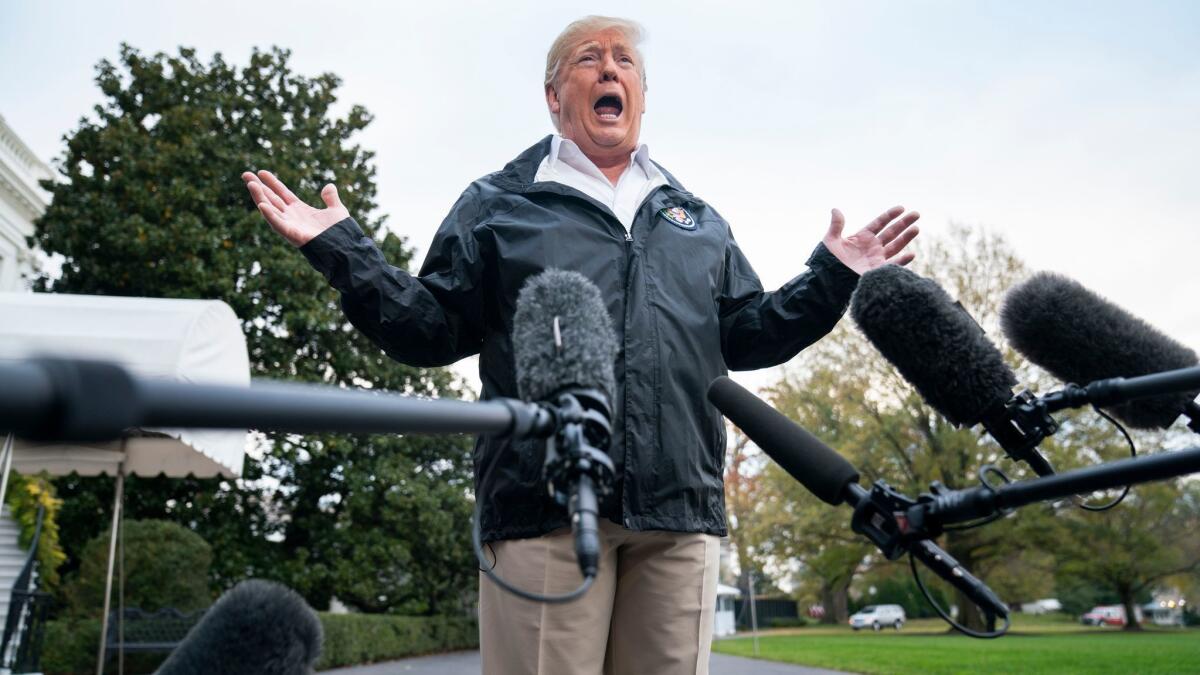Op-Ed: Trump may fire Mueller, but he can’t fire Mueller’s grand jury

- Share via
Senate Republicans blocked the so-called Mueller protection bill this week, with Majority Leader Mitch McConnell calling the legislation “a solution in search of a problem.”
But even if President Trump does fire special counsel Robert S. Mueller III, he can’t fire the federal grand jury involved in Mueller’s investigation.
According to the Supreme Court, grand juries occupy an independent constitutional niche. They exist on a border line between the judicial and executive branches, free from meddling by presidents and judges alike.
Once a judicially appointed replacement prosecutor were in place, the Mueller grand jury could continue without missing a beat.
Under Rule 6 of the Federal Rules of Criminal Procedure, a federal grand jury consists of between 16 and 23 randomly selected citizens, convened and supervised by a federal judge. They have a duty to consider evidence of criminal wrongdoing presented to them by a cooperating prosecutor, and they have the power to decide for themselves — by a vote of at least 12 grand jurors — whether the evidence is strong enough to warrant a formal criminal charge.
Rule 6 provides that, once a federal judge has empaneled a grand jury for its maximum term of 18 months, with a possible extension of six months, no one except the convening judge can disband it. Although federal grand juries are supervised by federal judges to assure that they act in accordance with law, no one can interfere with a grand jury’s independent consideration of admissible evidence, or its decision whether to vote to indict.
Not the cooperating prosecutor. Not the supervising federal judge. Not even the president.
Rule 6 also bars anyone except the grand jurors themselves from being in the room while they decide whether to vote for an indictment. If an independent grand jury does vote to indict, the constitutionally defined criminal process moves to the next phase: a formal criminal trial before an equally independent petit jury. (The terminology comes from a pre-revolutionary British practice.)
The petit jury consists of 12 randomly selected citizens (chaired by Henry Fonda) who decide whether the evidence is strong enough to establish a defendant’s guilt beyond a reasonable doubt. As with a grand jury, no one can force a petit jury to convict or otherwise interfere in its deliberations.
So President Trump lacks the power to disband a federal grand jury, and there is even an independent mechanism for replacing Mueller, should the president or his acting attorney general move to upend the investigation by firing the special counsel. The judge who is supervising the grand jury — Chief Judge Beryl A. Howell of the U.S. District Court for the District of Columbia — would have ample power to defend its integrity and independence by immediately appointing a new prosecutor who could take his place.
There’s nothing particularly controversial about judges appointing prosecutors to protect pending grand juries. Congress has explicitly authorized federal judges to appoint temporary prosecutors if the president fails to fill a vacancy within 120 days.
In fact, the New York federal prosecutor leading the federal grand jury investigation of Trump’s fixer-lawyer, Michael Cohen, was appointed by a vote of 40 federal judges sitting in the Southern District of New York. This took place after Trump fired the United States attorney and dragged his feet in nominating a permanent successor.
Most of the time, federal judges exercise only the powers that Congress gives them. Though the Supreme Court has held that Congress could grant federal judges the power to appoint independent prosecutors investigating high-ranking members of the executive branch, the current Congress is, unfortunately, missing in action.
But there is a way for Howell to protect the Mueller grand jury even without Congress. She could exercise her “inherent” judicial power. Since 1882, the Supreme Court has recognized that federal judges possess inherent power to issue court orders barring government officials from acting in violation of the Constitution, and to do so without waiting for congressional authorization.
The Supreme Court has also recognized that federal judges possess inherent judicial power to impose damage awards on federal officials who have violated the Constitution; to punish disruptive efforts to interfere with pending judicial proceedings; and to impose attorneys’ fees awards on bad faith litigants.
The late Justice Antonin Scalia even persuaded his fellow justices that federal judges possess inherent power to invent new defenses for federal military contractors. If federal judges have inherent power to protect military contractors, they clearly have inherent power to protect sitting grand juries.
Enter the Fray: First takes on the news of the minute from L.A. Times Opinion »
If a judge were to appoint a replacement prosecutor, then the Mueller grand jury could continue without missing a beat. They would have access to all the evidence developed so far, as well as the power to continue all pending investigations.
The grand jurors would be free to follow the trail of criminal wrongdoing wherever it may lead and make an independent determination about who, if anyone, should be charged with a crime.
Perhaps most importantly, they would also have the historic power, codified in the 5th Amendment, to issue a “presentment,” a report to the supervising judge detailing alleged criminal activity. She would then decide whether to make it public.
Burt Neuborne is a professor of law at NYU Law School and the founding legal director of the university’s Brennan Center for Justice. He is the former national legal director of the American Civil Liberties Union.
Follow the Opinion section on Twitter @latimesopinion or Facebook
More to Read
A cure for the common opinion
Get thought-provoking perspectives with our weekly newsletter.
You may occasionally receive promotional content from the Los Angeles Times.






